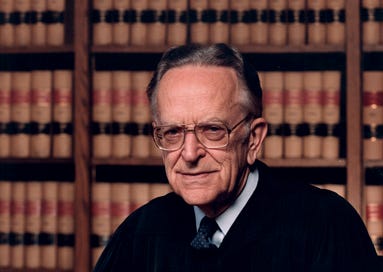The original SCOTUS decision that the constitution guarantees the right to abortion was apparently on legally shaky grounds. (See the fairly comprehensive Wikipedia article on Roe v. Wade.)
Justice Harry Blackmun, author of the Roe v. Wade decision. The decision was joined by six other justices: Chief Justice Warren Burger and Justices Potter Stewart, William J. Brennan Jr., William O. Douglas, Thurgood Marshall, and Lewis F. Powell Jr. Justices Byron White and William Rehnquist dissented.
The Roe v. Wade decison stood for nearly half a century (1/1973 - 6/2022).
Donald Trump takes credit for the overturning of Roe v. Wade, claiming that it is more appropriate to leave abortion regulation to the states. After the overturning of Roe v. Wade, the Comstack Act of 1873 (and subsequent amendments) remained the primary (only?) federal regulation of abortion. Comstack Act does not regulate abortion per se; it regulates the use of the US mail (or private delivery services or Internet websites(!)) to provide information or materials that can be used in illegal abortions (or obscenity). (Information about legal abortions is protected by the First Amendment.) (The Wikipedia article on the Comstack Act provides much more detailed information.) Although the law is still valid, it has been used recently only in cases involving child pornography.
Current Florida law prohits abortions after the sixth week of pregnancy. If approved in November, Florida’s Amendment 4 would repeal that limit. According to USA Today, Trump said in an interview with Fox News that “he will vote No on Florida Amendment 4 despite also maintaining that he believes the state's six-week ban is too strict.”
It seems to me that the simplest way out of the abortion law controvery is to agree (a) that the original Roe v. Wade was legally sloppy and (b) that decisions about abortions should not be made by any government, federal, state, or local, but by the pregnant woman—in consultation, if she desires, with her family and medical providers.
I would also argue that abortions laws violate the First Amendment requirement to keep church and state separate. The pro-life community argues against abortion on the grounds that personhood begins at conception—and if not at conception, at some other time prior to birth. Their position is that at some moment between conception and birth a human fetus becomes an “unborn child” and as such deserves government protection. The pro-choice community argues that a fetus becomes a person in the eyes of the law only at birth; prior to birth a fetus does not have the full rights of personhood and should not expect protection of its personhood by a government.
So the question becomes: when does personhood inhere? Current laws differ from state to state—a practical acknowledgement that the legal moment of personhood is esentially arbitrary. As far as I know, there is no objective way to determine when a fetus becomes a person.
It strikes me that this is similar in kind to the question of what happens to a person after death. This is a paradigmatically religious question; no one would argue that a government should mandate an answer. Since there is no general agreement, we should take as similarly religious the question of what happens when personhood first inheres—and hence is not the business of government.





If put the other way around, the question is whether we want a law that outlaws such a drug. You and many others may believe that it is unethical to use such a drug if it existed. That's not the same thing as saying that there should be a law that makes it a crime to use such a drug. There are many things that most people would consider unethical that are not and probably should not be illegal. Would the use of such a drug belong in that category?
If there were a broad consensus that the use of such a drug were so unethical that it should be made illegal, that would be similar to saying that personhood inheres in the 8th month of pregnancy and that fetuses in their eighth month of development deserve government protection as a person.
Such a position raises other questions. Two that come to mind are the following.
a) What other personhood rights, if any, does such a fetus have?
b) How should it be determined, for the sake of legal decision-making whether a fetus has met the given requirement? In other words, is there a straightforward test that the governement can apply to determine whether a fetus is in its eighth month--or is viable, or whatever the criterion for personhood becomes? How invasive of the body of a pregnant woman would such a test be? What would the penalty be for a woman who refuses to submit to such a test? Would a pregnant woman be required to testify as to the date on which she became pregnant? Again, what would be penalty be for refusing to testify. Would the medical provider for such a women be required to testify about such an estimated date? Might the penalty for refusing to testify be that the medical license of the provider be revoked or suspended?
The alternative, i.e., that the use of such a drug is not made illegal, would not be equivalent to a government assertion that the use of such a drug is ethical--only that the government makes no ethical or legal assertion at all about the use of such a drug. (Are there laws to the effect that certain things are allowed? I guess there are regulations, such as speed limits and traffic signals, that identify allowed activities. But those seem to be in areas in which governement regulation applies.)
Does a fetus acquire a right to life only at birth or at viability? If there were an abortifacient that could kill an 8 month fetus in utero, would we want that to be a legal option?